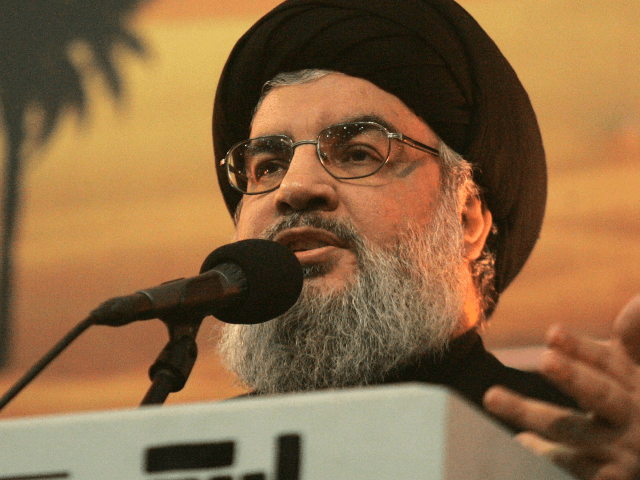Hassan Nasrallah, the head of the Iran-backed Shiite terrorist organization Hezbollah, lamented on Iranian television on Thursday that he could not trade his life for that of Major General Qasem Soleimani, eliminated in a U.S. airstrike in January.
Soleimani was considered Iran’s most prominent and dangerous terrorist leader at the time of his death. President Donald Trump ordered an airstrike on his convoy in Baghdad, where he was believed to be organizing imminent attacks on U.S. forces. The weekend before his death, a mob of pro-Iranian militants attempted a failed storming of the U.S. embassy in Baghdad and named Soleimani as their leader.
As head of the Islamic Revolutionary Guard Corps (IRGC) Quds Force, Soleimani was believed to be the leader managing Iran’s international terrorism strategy, leaving a significant gap in Iran’s foreign terrorism policy. American analysts have credited him with spearheading efforts to use roadside bombs in Iraq to kill and dismember American soldiers; he and forces he commanded are believed to be responsible for hundreds of American deaths.
On Thursday night, in an interview that was part of a larger coverage of the 40th day since Soleimani’s death, Nasrallah dramatically offered his soul to the grim reaper in a hypothetical conversation with the spiritual force.
According to Iran’s Mehr News Agency, Nasrallah appeared on the verge of tears discussing Soleimani, calling him the “master of Axis of Resistance’s martyrs.” The “axis of resistance” is the global coalition of nations against the United States and the human rights ideals typical in the West.
Nasrallah said in the interview that he had imagined the possibility of trading his life to God for Soleimani’s.
“Haj Qasem was not merely a military commander, he possessed a great multi-aspect character,” Mehr quotes Nasrallah as saying. “He was tireless; he worked round the clock without any hesitation. … When we talk about Hajj Qasem’s legacy, it means taking risks and moving toward the danger in battlefields.”
Nasrallah’s Hezbollah group, based officially in Lebanon, is facing significant challenges during the Trump era. U.S. State Department reports have confirmed that Hezbollah has run into so much trouble fundraising that it has resorted to placing piggy banks at supermarkets in neighborhoods friendly to the terrorist group to keep its activities afloat. Experts believe that much of Hezbollah’s funding comes from Iran and illicit trade with Venezuela, both of whom have suffered under crippling American sanctions intended to limit their ability to commit human rights abuses.
Hezbollah in Lebanon, a formal political party, is also reportedly losing influence, in part due to months of protests against established political actors. The protests formed the creation of a new government, but many in the protest movement have expressed little hope that the new formation will bring about legitimate change to the country.
“We don’t trust Hezbollah, as it’s a partner of the current political game,” Raneem al-Ahmar, a Lebanese political activist, told Israel’s Ynet news. “They manipulated us.”
Soleimani often worked closely with Hezbollah agents throughout Iran’s spheres of influence, which span from Palestine to Yemen.
Mehr repeated the Iranian regime’s talking points that Soleimani spent time in Syria and Iraq to fight the Islamic State for the greater good of humanity. In reality, Soleimani was dispatched to Syria at the height of the civil war there to help dictator Bashar al-Assad stay in power. Soleimani reportedly helped Assad attack civilian rebel strongholds, killing hundreds and dislodging millions from their home; he also organized supply distribution from Iran to Assad regime forces.
“The top Iranian general also warned various political factions and figures to remain united in order to ward off enemies’ plots, noting that in case of division in the ranks of the nation and political officials, the country and the Islamic establishment as a whole would be damaged irreparably,” the Iranian state outlet PressTV reported.
The outlet also commemorated Soleimani’s death by republishing propaganda pieces written in the wake of his death, heralding him as a “peace champion” and proclaiming his death an “act of war, the highest of high crimes.”
The event honoring Soleimani, as translated by The National, an Emirati newspaper, also included remarks from the head of the IRGC, Gen. Hossein Salami, once again threatening the United States.
“If you make the slightest error, we will hit both of you,” he said, presumably including Israel alongside Washington.

COMMENTS
Please let us know if you're having issues with commenting.